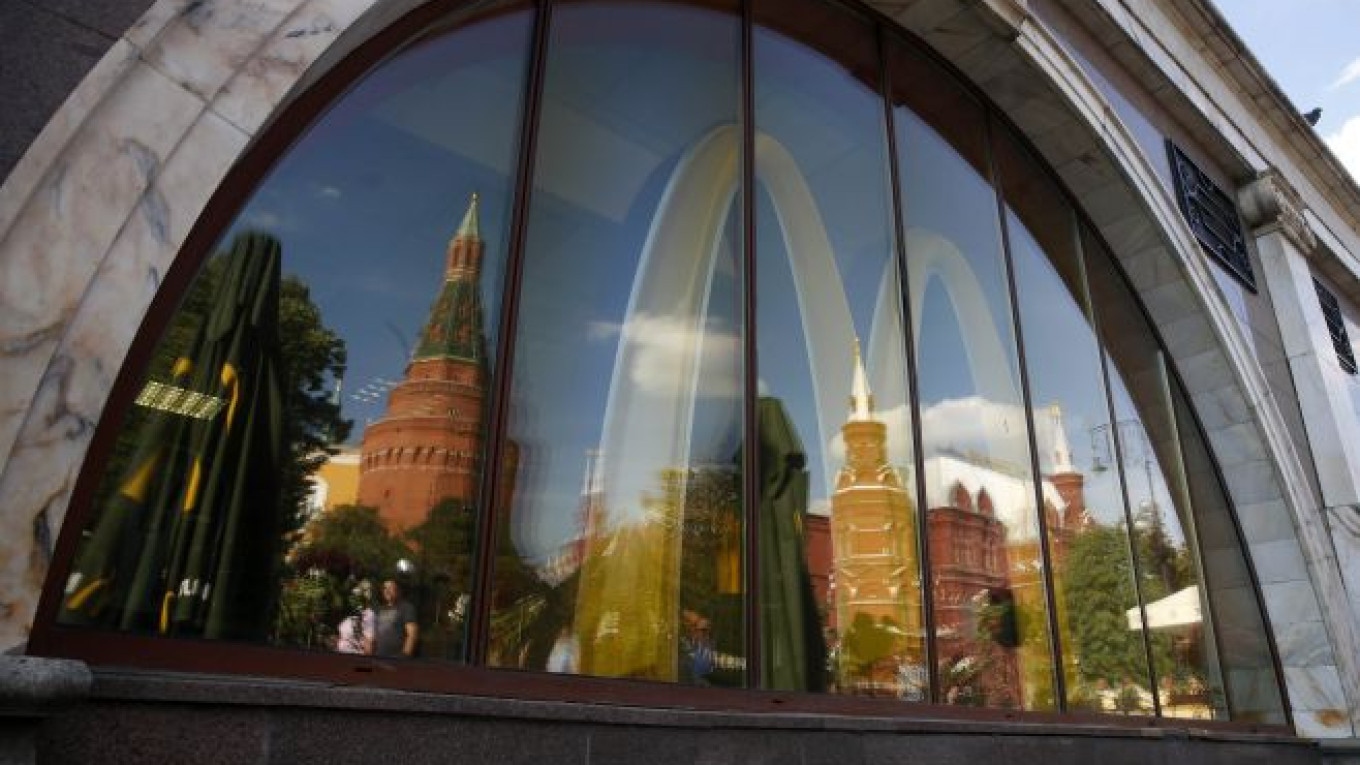Since Russia's health watchdog unceremoniously shut down four McDonald's in Moscow on Wednesday, the campaign against the iconic U.S. fast food chain appears to have gone viral.
Sanitary inspections were announced Friday everywhere from Novosbirisk, Siberia's largest city, to the single McDonald's restaurant to be found in the tiny republic of Adygeya near the Black Sea, according to news agency RIA Novosti.
Some of the checks were already spiraling into possible closures: Health violations were reported at McDonald's locations in the populous republic of Tatarstan, Reuters reported.
The campaign began with inspections by the Federal Consumer Protection Service in late July and seized headlines Wednesday with the suspension of operations at four restaurants in central Moscow over alleged sanitary violations, including the very first McDonald's ever opened in Russia after the fall of the Soviet Union — which McDonald's says is its busiest branch in the world.
The move has been viewed as a political crackdown emanating from widespread anti-American sentiment kindled by the crisis in Ukraine.
Some U.S. businessmen have begun to worry that other classic brands could be next. Inspectors in the Sverdlovsk region on Friday said they discovered a chemical commonly used in insect repellant in batches of Jack Daniel's Tennessee Honey Whiskey and threatened to sue stores still carrying the product.
However, the Federal Consumer Protection Service insists that politics have nothing to do with it and even says that the inspections at McDonald's restaurants in various regions are unrelated.
"A series of separate legal entities are being inspected, which are connected only by the brand," Anna Popova, the head of the Federal Consumer Protection Service, told Interfax, adding that the inspections had been planned since 2013.
There appears to be disagreement in the ranks, however. Olga Fomicheva, an official at the Tatarstan branch of the watchdog, told Interfax on Thursday that the region's inspections were unscheduled.
Russian politicians, meanwhile, came out on all sides of the affair. Vladimir Zhirinovsky, the rabble-rousing leader of the Liberal-Democratic Party, on Friday called for a McDonald's sign in the Moscow city center to be ripped down, ITAR-Tass reported.
"We need to get rid of this sign, this disgusting sign has to go. What gives them the right to teach us how to make pirozhki [stuffed Russian buns]!" Zhirinovsky exclaimed to the few dozen people assembled at a political rally calling for the downfall of U.S. fast food and a return to the flag of the Russian Empire.
Others had a less sanguine view of the matter, such as Evgeny Roizman, the mayor of Yekaterinburg and a prominent opposition figure.
"If we consider ourselves a great country and a great power, then these are petty deeds, on the level of mice," Roizman said in an interview on Komsomolskaya Pravda radio, news portal Ura.ru reported.
"It's a blow to our own people — to consumers, for one, and obviously all the suppliers are locals. Hitting your own people doesn't make any sense," he said.
McDonald's agrees. Asked how much money the company stands to lose from the store closures, the company's official country representative Nina Prasolova directed attention to the employees who are going to suffer.
"We are not going to assess the losses. People have been left without work and are losing their salaries," Prasolova told ITAR-Tass. About 1,500 people work in the 17 McDonald's restaurants in the republic of Tatarstan alone.
Undeterred by the raids, McDonald's is committed to plans to expands its presence in Russia, where it already operates 440 restaurants. The northern republic of Karelia will see its second McDonald's open within the next few days, a company representative told ITAR-Tass.
See also:
Russian Watchdog Finds Insect Repellent in Jack Daniel's Whiskey
A Message from The Moscow Times:
Dear readers,
We are facing unprecedented challenges. Russia's Prosecutor General's Office has designated The Moscow Times as an "undesirable" organization, criminalizing our work and putting our staff at risk of prosecution. This follows our earlier unjust labeling as a "foreign agent."
These actions are direct attempts to silence independent journalism in Russia. The authorities claim our work "discredits the decisions of the Russian leadership." We see things differently: we strive to provide accurate, unbiased reporting on Russia.
We, the journalists of The Moscow Times, refuse to be silenced. But to continue our work, we need your help.
Your support, no matter how small, makes a world of difference. If you can, please support us monthly starting from just $2. It's quick to set up, and every contribution makes a significant impact.
By supporting The Moscow Times, you're defending open, independent journalism in the face of repression. Thank you for standing with us.
Remind me later.


